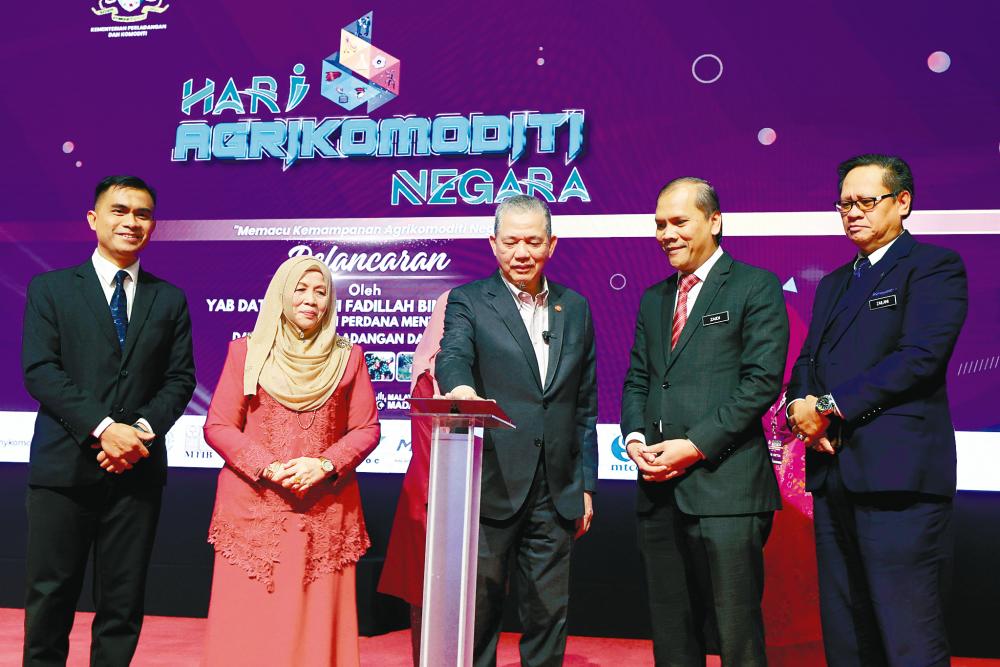PUTRAJAYA: The agrotourism initiative, the improvement of mechanisation and automation skills and the cooperation of stakeholders in the agricommodity sector need to be intensified to ensure the sustainability of the sector in the face of uncertainties in the global market next year, said Deputy Prime Minister Datuk Seri Fadillah Yusof.
Considering the agricommodity sector as the main pillar of the country's economy, Fadillah who is also the Minister of Plantation and Commodities. said Malaysia needs to maintain the momentum of the sector so that the commodities produced can compete in the global market.
“Our agency will focus on how we can improve research in addition to establishing collaboration with the industry or academics to produce new technology based on automation and mechanisation,“ he said when officiating at the National Agricommodity Day (HAKN) celebration here today.
Giving examples of automation and mechanisation skills that can be highlighted such as the use of drones and machines, Fadillah said it would also indirectly reduce dependence on external labour as well as attract youths to be involved in the agricommodity industry.
“Competition is getting fiercer and we can no longer depend on external energy like Indonesia for example because they are also growing economically.
“Maybe getting skilled workers is a challenge for us, that’s why we have to be skilled in technology, mechanisation and automation,“ he said.
He said the role of the Ministry of Plantation and Commodities (KPK) is not only as a 'regulator' and 'facilitator' but has the main goal of ensuring the increase in productivity or yield in the agricommodity industry, while also contributing to their source of income.
He said KPK also needs to help small farmers increase their income.
“But this will only succeed if we all increase our close cooperation because the ministry alone will not be able to implement or achieve our target to make this country a developed and prosperous country by producing high yield products, not only from downstream, but from upstream as well,“ he said.
During the press conference after the celebration, Fadillah said the agricommodity sector can be developed into agrotourism where entrepreneurs can take the initiative to create tourism elements in their shops or gardens as tourist attractions.
Giving the example of Lee's Cocoa Shop in Tanjung Sepat, Selangor, Fadillah said that in addition to growing cocoa, the entrepreneur also opened opportunities for many students and researchers to learn about the process of growing cocoa and chocolate production.
Along with the growth in the agricommodity sector, he said the development of the biomass industry, especially in the fields of farming and animal husbandry, will also be emphasised.
“We want to see how the materials and waste that are not used can be processed into animal feed or fertilisers or produce downstream products from these waste materials,“ he said.
During the event, Fadillah presented several awards to selected recipients from the palm, rubber, timber, cocoa, pepper and kenaf sectors in conjunction with HAKN, which was held for the first time, aimed at recognising and appreciating the services of Malaysians involved in developing the agricommodity sector at all levels.
Among the recipients of the award were Maggie Agam who received the Best Small Pepper Grower Award and Datuk Dr Freezailah Che Yeom who won the Timber and Forestry Industry Leadership Award.
The celebration of HAKN is an initiative by KPK in line with the Madani Economy in pursuing the aspirations of economic prosperity and people's well-being through product development activities related to the agricommodity sector in order to remain progressive, sustainable, competitive and inclusive. – Bernama









